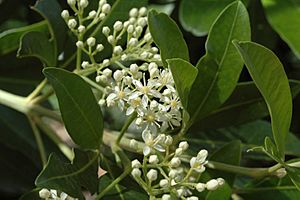Acradenia facts for kids
Quick facts for kids Acradenia |
|
|---|---|
 |
|
| Acradenia euodiiformis in the ANBG | |
| Scientific classification |
|
| Kingdom: | Plantae |
| Clade: | Tracheophytes |
| Clade: | Angiosperms |
| Clade: | Eudicots |
| Clade: | Rosids |
| Order: | Sapindales |
| Family: | Rutaceae |
| Genus: | Acradenia Kippist |
| Species | |
|
|
| Synonyms | |
|
Luerssenidendron Domin |
|
Acradenia is a small group of plants. It includes two types of trees or shrubs. These plants belong to the Rutaceae family, which also includes citrus fruits. You can only find them in Australia, meaning they are endemic there.
These special plants have leaves made of three leaflets. They are called trifoliate leaves. The leaves grow in pairs, directly opposite each other on the stem. Their flowers are quite pretty. They usually have five sepals (small leaf-like parts that protect the bud). They also have five petals (the colorful parts of the flower). Inside, there are usually ten stamens (the parts that make pollen). These stamens are often different lengths.
Contents
What Acradenia Plants Look Like
Plants in the Acradenia group are evergreen trees. This means they keep their leaves all year round. Sometimes, they grow as shrubs instead of tall trees.
Their leaves are special because they are trifoliate. This means each leaf is made up of three smaller leaflets. These leaves grow in pairs, one directly across from the other on the stem. They do not have tiny pockets called domatia on their leaves.
The flowers of Acradenia plants grow in clusters. These clusters are called panicles. You can find them growing where a leaf meets the stem (called a leaf axil). They can also grow at the very ends of the branches.
Acradenia flowers are bisexual. This means each flower has both male and female parts. They usually have five sepals and five petals. Sometimes, they might have six of each. The sepals are small, about 1 to 1.5 millimeters long. They are joined at the bottom and stay on the fruit as it grows.
The petals overlap each other at their base. There are twice as many stamens as petals. These stamens usually alternate in length, meaning long and short ones are next to each other.
Inside the flower, there are usually five carpels. These are the parts that will become the fruit. Each carpel has two ovules, which are like tiny seeds waiting to grow.
When the fruit forms, it has up to five sections called follicles. These follicles are joined at the bottom. Each follicle holds one smooth, brown seed. The seeds are about 5 millimeters long.
How Acradenia Got Its Name
The group of plants called Acradenia was first officially described in 1853. A scientist named Richard Kippist wrote about it. He published his description in a book called Proceedings of the Linnean Society of London. The very first species he described from this group was A. frankliniae.
The plant group most closely related to Acradenia is Crossosperma. This related plant group comes from a place called New Caledonia.
Types of Acradenia Plants
There are two main types, or species, of Acradenia:
- Acradenia euodiiformis (F.Muell.) T.G.Hartley - This plant is also known as yellow satinheart or bonewood. You can find it in N.S.W. and Qld. in Australia.
- Acradenia frankliniae Milligan ex Kippist - This plant is called whitey wood or wirewood. It grows in Tas.
See also
 In Spanish: Acradenia para niños
In Spanish: Acradenia para niños
 | William L. Dawson |
 | W. E. B. Du Bois |
 | Harry Belafonte |

